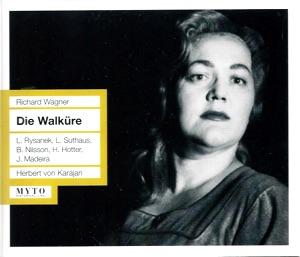
Myto’s transfer of Herbert von Karajan’s star-bedecked 1958 Die Walküre from La Scala gives collectors on a budget access to one of the legendary performances committed to tape—one that lay undiscovered in a Milan collection for decades. Sadly, congested orchestral sound, ill-timed dropouts and pitch issues, especially in the final scene, will test the most patient listener and makes the experience feel like sorting through precious heirlooms after a flood.
The performance places the young Birgit Nilsson opposite an aging but still formidable Hans Hotter, with Leonie Rysanek, Ludwig Suthaus, Gottlob Frick and Jean Madeira rounding out what legitimately qualifies as a dream cast. In the pit, the 50-year-old Karajan leads a vivid account that offers further proof his earlier work was more spontaneous and less self-indulgent than anything found on the later recordings.
Wotan’s emotionally charged Act 3 farewell is intimate yet epic, with Hotter’s evident fatigue and scrupulous attention to text giving the performance a particularly anguished touch. Karajan’s energetic pacing and his ability to extract orchestral color must have made the live performance spine-tingling.
Nilsson opened the 1958 La Scala season as Turandot with Karajan and though she confessed to having a case of nerves before big performances, this first night Die Walküre brims with self-assurance. The “Todesverkündigung” is chilling and dark-hued, marred only by an inexplicable cut that Karajan evidently sanctioned. Brünnhilde’s high B’s and C’s in the cries of “Ho-jo-to-ho!” hit the bullseye in blazing fashion, without the upward portamenti.
And Nilsson strikingly morphs from frightened child into sage adult in the pivotal “Der diese Liebe mir ins Herz gehaucht,” arguing her decision to disobey Wotan and intervene on Siegmund’s behalf was what Wotan really wished. Though her vocal shadings are more clearly rendered on the 1962 Erich Leinsdorf RCA release, the soft singing seems tidier here with the tone just a bit steelier.
Rysanek graced opera stages as Sieglinde for more than three decades. Some of her soaring high notes in this performance are almost entirely washed out by distortion, but the warmth and passion of the characterization comes through, no more so than when she learns she’s carrying Siegmund’s child. The trademark scream at being shown Siegmund’s blade also is, well, orgasmic. And the beloved singer’s midrange weaknesses are less evident on this set than on some of her later recordings.
Her Siegmund, Ludwig Suthaus, fares less well. At 51, the heldentenor with the baritone-like cast sounds hesitant and slightly off the beat in parts of the opening act and overcompensates by shouting at climatic moments, such as when crying out for Wälse’s aid. It’s a marked decline from his famous 1954 account under Wilhelm Fürtwängler and surprisingly, the biggest shortcoming in the performance.
The depth of Hotter’s Wotan—listen to the remembrances of more carefree times with his daughter and the inscrutable quality of the parting line “Denn so kehrt der Gott sich dir ab”—compensates for a wobble that was developing around this time and occasional breathy, off-pitch singing. Whether intentional or not, few artists have better captured a god in decline who’s caught between love and duty, or his still fearsome outbursts. In some ways, it’s a more poignant portrayal than Hotter’s more polished studio releases.
Things turn bad for Wotan in the pivotal middle act scene with Fricka, which Karajan takes at a brisk pace. The thick-toned Madeira is a piquant presence, with biting lines that tumble forward and leave practically no room for dissent. The wonderful bass Frick rounds out the principals as a glowering Hunding whose dark tones are positively chilling, even through the tinny sound. The Valkyries, including a young Christa Ludwig as Waltraute, suffer from suboptimal miking, introduced by a Ride that unexpectedly hiccups over several measures either due to a flaw in the original source material or clumsy editing.
The La Scala orchestra is hot-blooded and highly responsive to Karajan’s urgings, though the congested din in many passages above forte makes it difficult to assess how well the instruments blend and distorts the stage-pit balance. If the musicians don’t sound quite at the level of the Bayreuth orchestras from this period and come apart in some key moments, they’re still rhythmically strong in stormy passages and generally achieve the level of tension Karajan seeks. If only they and the singers could be heard as clearly as say, on Karajan’s 1952 Tristan from Bayreuth.
Myto’s minimalistic booklet is limited to a track listing, a handful of production photos and a disclaimer that some small distortions are due to the original tape. One’s left grateful for a reading that purely on artistic merits, probably ranks among the top five recorded Walküres. That said, it’s not an essential purchase given how well the opera is represented elsewhere on record and disc, including by the same singers. Unless someone discovers superior source material, it’s by and large a reminder that you can’t always get what you want.


